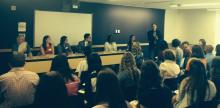What do you do with an LSJ degree?
While college is a time to expand perspectives and broaden horizons, most students are also concerned about the practical professional implications of their time in school. The question of what to do with a college degree can be a daunting one, so the Law, Societies, and Justice Program invited students to join a panel of LSJ alumni to hear stories about their diverse career paths and how to capitalize on different professional opportunities.
The six panelists were: Roxanne Vierra ’80, a Civil Rights Specialist for King County; Pam Jones ’81, the Director of the King County Juvenile Detention Center; Kelly Stockman Reid ’89, the Executive Director of Friend of the Children-Seattle; Eric Gilman ’06, an Associate Attorney at the law firm of Gordon Thomas Honeywell; Jill Anderson ’08, a Commercialization Manager at Starbucks; and Liz Kent ’13, the Community Advancement & Donor Relations Coordinator at Make-A-Wish Alaska and Washington.
Each panelist gave an overview of their job and the path that they took to get from UW to where they are now. The main point that each individual touched on was the importance of internships and volunteer opportunities.
The most recent graduate, Liz Kent, emphasized that point. “I interned at Make-A-Wish for my full senior year when I was at UW and I was really lucky that a job opened up right when I was finishing up my internship,” she said. “Don’t turn down any opportunities that come your way because you really don’t know where they are going to lead and what connections you might make from there.”
Pam Jones underscored this idea, saying “I knew that I wanted to be an attorney, and there was no doubt in my mind that was what I was going to do and that I just needed to find a route to get there, but then I started my internship with the King County Juvenile Detention Center. I started there as a volunteer and then all the sudden it was ‘Oh wow, I’m just hooked on kids.’ That was my passion right there, working with youth.”
Kelly Reid also discussed the importance of her internship work. “The best experience I got was the volunteer work,” she said. “The paid job was a lot of grunt work, lots of paper, lots of bosses to report to. The volunteer work was really awesome and I’d say that’s what led me to what I am doing now.”
Roxanne Vierra stressed the importance of going outside your comfort zone, which is precisely what she did. “I heard about a job as a civil rights investigator with the city office for civil rights,” she recalled. “I wasn’t crystal clear on what those folks did, but I went ahead and interviewed for it anyway and they thought I had the writing skills and communication skills so they hired me and trained me.”
Eric Gilman summed the evening up well by stressing the need to keep searching even in the face of rejections. “Persistence is a theme and luck is a theme,” he said. “You have to keep positive about your prospects out there. People are going to say no to you and it is not necessarily a reflection that you’ve done a bad job.”
But, he noted, “Luck is the residue of skill and tenacity and effort. You have to make the effort and do the things that position yourself as well as possible so when that job or that opportunity opens up you’ve at least done everything you can to put yourself in that best position and you still might not get the job.”
One of the other big points of agreement amongst the panelists was the initial desire to go to law school that was assuaged by internships and professional experience while, and directly after, earning their undergraduate degree. Most panelists said that they learned that they were able to pursue their field of interest without a law degree or that a different direction better suited their interests.
Eric, the lone panelist with a law degree, said in response, “This is a reality that all of you need to think about. It is incredibly expensive to go to law school, you incur a lot of debt to do so, and a lot of people don’t like it. They don’t just not like it, they really don’t like it.”
Jill Anderson is happy in the business world, and enjoys helping develop marketing plans for new Starbucks products. She noted that having a degree in a program with an unusual name provided a nice conversational entry point in some of the job interviews she conducted. She also stressed that the LSJ degree helped her tremendously to see the world from multiple perspectives. This enables her to engage constructively with a wide array of colleagues and business partners.
For those who were unable to attend the event, a video of the entire panel discussion is posted below for your convenience.
This article was written by Chase Beauclair.
